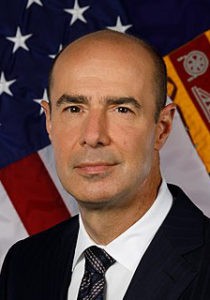To supporters, it is a “clarification” that protects religious expression. To critics it is yet another misuse of religious liberty language to promote discrimination.
The “it” in this case is a U.S. Labor Department rule issued in the last days of the Trump administration that will not take effect until 12 days prior to the change of presidential administrations.
The announcement on Monday, Dec. 7, was described by Slate as “a sweeping new regulation that allows federal contractors to discriminate against racial and religious minorities, women, and especially LGBTQ people in the name of protecting ‘religious liberty.’ It effectively abolishes critical workplace protections for these contractors that have been in place for decades, reframing religious freedom as a near-limitless license to discriminate.”
The Labor Department said the rule will provide a “clearer interpretation” of the exceptions of Title VII and the 1965 executive order that established non-discriminatory practices for federal contractors.
The Labor Department acknowledged that “religious organizations may prefer in employment ‘individuals of a particular religion.’”
Government Executive, a news service geared to federal government employees, reported that the Labor Department acknowledged that “religious organizations may prefer in employment ‘individuals of a particular religion.’”
The news service explained: “The department first issued the proposed rule in August 2019, and it was immediately met with widespread criticism that it would sanction discrimination. It received over 109,000 comments during the public comment period and is one of the ‘controversial and consequential’ regulation changes the administration is pursuing during its lame duck period, according to a ProPublica tracker.”
The 159-page rule reads like a legal paper and cites numerous administrative precedents, court rulings and historical facts. It cites as justification for the change several U.S. Supreme Court rulings — themselves highly controversial — such as the Masterpiece Cake Shop ruling on cakes provided for same-sex weddings and the Hobby Lobby decision on whether closely held corporations are allowed to discriminate in employment.
At issue is whether businesses or organizations that discriminate in hiring may receive government funding as contractors.
At issue is whether businesses or organizations that discriminate in hiring may receive government funding as contractors.
When first adopted in 1965 as an executive order by President Lyndon Baines Johnson, as a follow-up to the Civil Rights Act, contractors were required to post notices on hiring that they will not “discriminate against any employee or applicant for employment because of race, creed, color or national origin.” Later presidents added sex, sexual orientation and gender identity to the list of protected traits.
From the beginning, an exception was allowed for religious educational institutions. The new rule broadens the definition of a “religious” contractor to include for-profit corporations — justified in part by the Hobby Lobby decision.
The new rule also allows employers to define their “religious tenets” that justify discrimination — justified in part by the Masterpiece Cake case.
Finally, the rule makes it more difficult for the Department of Labor to prove that a contractor engaged in discrimination.
The Labor Department described the changes as demonstrating “an abiding respect for religious organizations and allowing these organizations to fully participate in federal contracting without sacrificing their right to be religious.”
Amanda Tyler, executive director of BJC, called the new rule “an aggressive move that betrays workers by expanding the type and number of businesses which can base employment decisions on the employer’s religious beliefs.”
“It ignores the vital distinctions between protecting religious liberty in the context of religious organizations that provide social services with private donations as opposed to religious organizations that seek government funding to provide social services under a federal contract,” she explained.

Rachel Laser
Rachel Laser, president of Americans United for Separation of Church and State, lambasted the new rule as yet another attempt to redefine religious liberty as only about the free exercise of some peoples’ religion while ignoring the danger of granting special rights to certain religious ideals.
“It’s unconscionable, though hardly surprising, that the lame-duck Trump administration would expand the ability of federal contractors — who employ one-fifth of the American workforce — to use religious litmus tests to hire or fire employees for jobs paid for with taxpayer dollars.”
The new rule “puts countless peoples’ jobs at risk because they do not share the religious views or meet the religious code of conduct of a government contractor,” she said. “Like so many others issued by the Trump administration, this rule particularly puts at risk workers who are LGBTQ, women, religious minorities and non-religious people.”

Eugene Scalia
Labor Secretary Eugene Scalia is the son of the late Supreme Court Justice Antonin Scalia, who is revered by conservatives and reviled by liberals. The younger Scalia, like other Trump appointees, has worked vigorously to dismantle federal regulations on workers’ rights, health and safety.
In its critique of the new rule, Slate cited an example specific to Baptists.
In the past, under the existing rule, a Baptist college could hire Baptist professors. “Scalia’s rule alters the definition of ‘religion’ to include ‘acceptance of or adherence to religious tenets as understood by the employer.’ So, a Baptist college could not just favor Baptist employees, but demand that its employees adhere to its interpretation of specific Baptist teachings. If an employee practiced her faith differently from her boss, she could be fired.
Elsewhere, Slate explains, “an employee who takes birth control, gets a divorce or obtains an abortion could be fired for violating her boss’s religious ‘tenets.’ A gay employee could be fired for marrying his partner. A transgender employee could be fired for transitioning. Any personal decision that contradicts ‘religious tenets as understood by the employer’ would serve as grounds for termination.”
The incoming Biden administration is likely to reverse this rule change, but doing so may take months. The Trump administration rule is set to take effect Jan. 8, which is 12 days before President-elect Joe Biden is sworn in.


